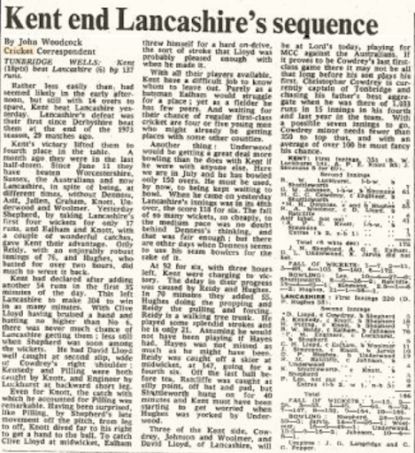In the city that
is the home of The Hobbit the chirpy
little local people overcame the evil force from the big bad world outside:
Wellington beat Auckland in the preliminary final of the T20.
I have
written before of the wisdom of getting to cricket matches in good time: http://mylifeincricketscorecards.blogspot.co.nz/2010/12/random-thoughts-on-ashes-adelaide.html
The
importance of this principle was manifest once more at the Basin on Friday.
Indolent spectators lacking in moral backbone who wandered in late after the
third over missed the best that this game had to offer: a 17-ball 46 by Jesse
Ryder. Twenty came from the first over, bowled by the unfortunate Matt Quinn,
with three fours, and a six kept in the ground at long on only by one of the
pohutukawas. Giving the new ball to the inexperienced Quinn was to ask a boy
bugler to lead the charge, particularly when the cunning and experienced Andre
Adams was available.
At the other
end, Ben Orton knew that his job was to get off strike as soon as possible,
which he did with a single off the first ball, bowled by the experienced
left-armer Michael Bates. In the rest of the over Ryder cover drove three boundaries,
one off the back foot and two off the front, the second lofted over the
infield. Three jewels of shots that would have looked shiny and beautiful in any
game of cricket. Ryder did not play a stroke today that was predetermined; each
was a response to the ball that was bowled.
Unbelievably,
Auckland captain Gareth Hopkins persisted with Quinn from the Vance Stand End.
Quinn looks very young and I seriously considered ringing the child protection
people at this point. Two fours and a towering six onto the bank were the
inevitable result, but from the last ball of the over Ryder was caught on the
square-leg boundary; had it carried two metres further it would have been a
17-ball fifty (not the quickest I would have seen: that was Matthew Fleming’s
16-ball effort in a rain-reduced ten-over Sunday League game for Kent v
Yorkshire in 1996). It was magnificent batting, with no qualification about it
only being T20. Mike Hesson, the Black Caps coach, is shortly to have a conversation
with Ryder about the possibility of a return to the national team for the forthcoming
England tour of these islands. This is how Hesson should begin this exchange:
Hesson:
Please Jesse (can I call you Jesse or would you prefer Mr Ryder?), you just
name the terms, you don’t have to practise, just turn up and bat, you can have
the house of whichever member of the New Zealand Cricket board you nominate and
your own body weight in whatever fast food you choose delivered daily to the
dressing room, but please play, I’m begging you.
A quietness
overtook the ground for a while, punctuated only by the repentant sobbing of
latecomers, as they learned what they had missed. Michael Papps began to build
an innings that was perfect for the circumstances, busy, with enough big hits
to keep the scoreboard moving at a good rate (by the way Basin Reserve
authorities, if you have a scoreboard which shows the scores of team and
batsmen by in the form of lit electric bulbs, wouldn’t it be an idea to check
that enough of the bulbs are working to enable spectators to see what those
scores actually are?). Papps was 70 not out from 48 balls at the end. He put on
79 for the third wicket with Cameron Borgas, who was no quicker about his work
than he had been against Otago last week: 29 from 33 balls, not fast enough for
the second half of a 20 innings on a good pitch. Borgas has a considerable
repertoire of unorthodox shots, but fewer than desirable of the orthodox variety
that have stood the test of time over the centuries as a means of moving things
along. He was caught at fine third man from a dilscoop, which was just as well
for Wellington as it brought in Luke Ronchi, who made 21 from just 11 balls.
Wellington
finished with 182 for four, a formidable target, but one that Auckland had the
firepower to chase down if they got a good start.
Tugaga removed
Lou Vincent lbw from the first ball of the innings, and Gareth Hopkins followed
in the second over, caught and bowled by slow left armer Mark Houghton. This
left Aaron Finch as the bearer of Auckland’s hopes and dreams. Finch was signed
just for the weekend, having been dropped from Australia’s ODI team, in which
he featured last weekend (the biggest cheer of the day, incidentally, was
raised not for a Ryder six, but for the news that Australia were 40 for nine
against Sri Lanka at the Gabba). He was man of the series in this year’s Big
Bash (as the Australian T20 is fashioned) and struck fluently from the start.
Ryder put him down at backward point, one of five chances that Wellington
spurned, something that has to be put right before the final.
Finch drove
the Auckland innings along at a fair pace, well supported by Craig Cachopa. They
were 84 for two in the tenth, and unease could be seen removing its hat and
taking a seat among the home supporters. But at this point Finch was bowled as
he made room to cut. From that point on wicket-taker Woodcock and Houghton (a
combined three for 52 from eight overs) exercised sufficient control and guile
to take the target over Auckland’s horizon. Ryder bowled with intelligence and
accuracy towards the end, and Auckland finished 23 runs short, the width of the
Sahara in T20 terms.
So it is off
to the deep south for Wellington, who face Otago in the final on Sunday.
